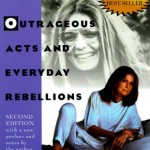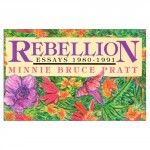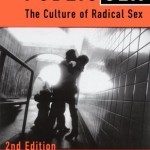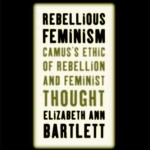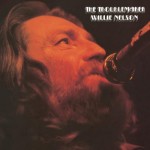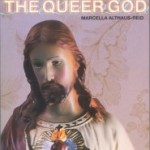Yes, this is my 50th post. 36,301 words, give or take a few. Not that I am counting or anything. In honor of this very “important” occasion I want to do a series of entries on my theory of the ethics of making, being in and staying in trouble. Rather fitting since making/being in/staying in trouble is the theme of this blog, don’t you think? Okay, there is another reason why I am posting these entries now. I am presenting on this subject at the Feminist Ethics and Social Theory (FEAST) conference in September and I need to start polishing my remarks. I thought working through them on the blog might be helpful.
Initially I was planning to post the entire presentation on here–in chunks of course. But, now I am thinking it would be better to pull out some troublesome bits (as in parts that I want to flesh out/clarify)and reflect on them. But in this entry, I think I will just introduce my project. Here is the abstract for the FEAST presentation:
ABSTRACT: In the 1990 preface to Gender Trouble, Judith Butler reflects on trouble and its value, concluding “that trouble is inevitable and the task, how best to make it, what best way to be in it” (Gender Trouble, vii). With this statement, Butler introduces a central theme that continues to shape and motivate much of her work: learning how to make trouble and be in trouble are important tasks of the resisting subject. In this presentation, which comes out of a larger project on troublemaking as a virtue, I argue that Butler’s opening statement about troublemaking in Gender Trouble is not only a critical and provocative intervention into feminist politics as usual, but is an ethical gesture towards the dignity, desirability and necessity of troublemaking. This gesture, which is taken up more explicitly by Butler in Undoing Gender, points to two separate but related ethical projects involving troublemaking. The first project is concerned with making trouble and being in trouble in ways that extend and rework norms so that they make more lives possible and livable. The second project is concerned with exploring what is demanded of us as moral selves as we strive to stay in trouble. I will conclude my presentation by tentatively linking the second of those projects with my own work on troublemaking as a feminist virtue.
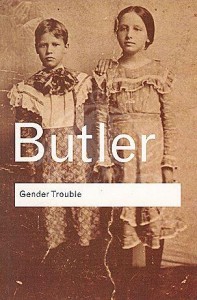 I am exploring the ethical possibilities of Butler’s work on troublemaking. It is exciting to see the recent interest, both by Butler and those writing about her, in connecting her work with ethics. For too long, the popular (among academics, that is) understanding of Gender Trouble is that is was not only counter but harmful to ethics/ethical projects. I remember this happening a lot in grad school. Ah, grad school…On the first day of every semester you had to go around the room and give your little spiel about what your academic interests were. Although I tried to mix it up, I usually ended up saying something about the ethical possibilities in the work of Judith Butler. One time, after giving my spiel, the professor sarcastically uttered, “good luck with that.” Oh bother. Anyway, the tide has changed and more scholars are writing and thinking about Butler and ethics. Moya Loyd writes about it. So do Samuel Chambers and Terrell Carver and Gill Jagger. Butler writes about it here, here, here, and with Catherine Mills and Fiona Jenkins here.
I am exploring the ethical possibilities of Butler’s work on troublemaking. It is exciting to see the recent interest, both by Butler and those writing about her, in connecting her work with ethics. For too long, the popular (among academics, that is) understanding of Gender Trouble is that is was not only counter but harmful to ethics/ethical projects. I remember this happening a lot in grad school. Ah, grad school…On the first day of every semester you had to go around the room and give your little spiel about what your academic interests were. Although I tried to mix it up, I usually ended up saying something about the ethical possibilities in the work of Judith Butler. One time, after giving my spiel, the professor sarcastically uttered, “good luck with that.” Oh bother. Anyway, the tide has changed and more scholars are writing and thinking about Butler and ethics. Moya Loyd writes about it. So do Samuel Chambers and Terrell Carver and Gill Jagger. Butler writes about it here, here, here, and with Catherine Mills and Fiona Jenkins here.
But, even as scholars have begun to think about ethics and Butler, their attention has frequently been on Butler’s Giving an Account of Oneself. What about Gender Trouble? Does it have anything to offer to ethics, feminist, queer or otherwise? Or is it part of a different stage in Butler’s thinking? On one hand, I can appreciate the need to turn to other texts. It is true, as Samuel Chambers and Terrell Carver suggest in their introduction to Judith Butler and Political Theory: Troubling Politics, that an overemphasis on Gender Trouble (which is often the only book that some people think Butler wrote) can obscure our understandings of Butler’s contributions to political [and ethical] thought beyond gender and gender performativity (5). However, failing to consider the ethical import of Gender Trouble could be sending the worrisome (well, at least to me) message that troublemaking/troublestaying, which is first and most directly articulated in Gender Trouble, has no ethical value. And often implied in that message is the idea that engaging in the troubling of gender is something that Butler used to promote–that is before she grew up and turned to more serious matters, like ethics and morality.
This idea that Gender Trouble and troublemaking is immature and therefore unethical raises several questions for me: 1. As Butler (and her work) has grown older, has she matured beyond Gender Trouble and troublemaking? Has she replaced her “childishness” and lack of seriousness (playfulness?) with more weighty matters–like being undone, normative violence, grief?; 2. Does one have to be “serious” and mature (that is, not young and immature) in order to engage in ethics? Can we imagine ethical visions that are not predicated on this equation of maturity + seriousness = responsible/accountable and ethical?; and 3. Is troublemaking too playful, too immature, and therefore not ethical?
In my own work, I offer a very strong “No!” to this last question. Indeed, I am devoting a huge chunk of this blog to the idea that troublemaking, as a practice and an approach to life, has much to offer to feminist and queer ethical visions/projects. And in my presentation at FEAST I argue that Butler plants the seed for her future work on troublemaking as ethical in Gender Trouble. It is my contention that Butler’s recent work on ethics is not so much a turn to ethics (and a turn away from all that playful/immature performativity of her past) but a return to or maybe an extension of the ethical gesture towards troublemaking/troublestaying that she first makes in the 1990 preface to Gender Trouble.

